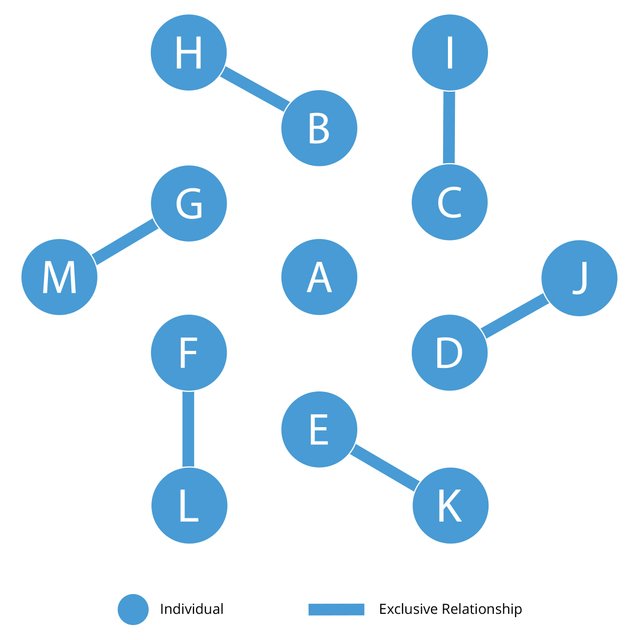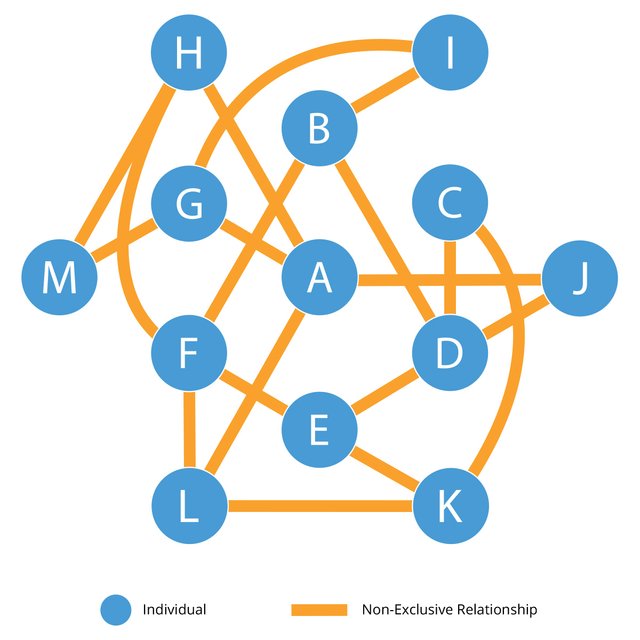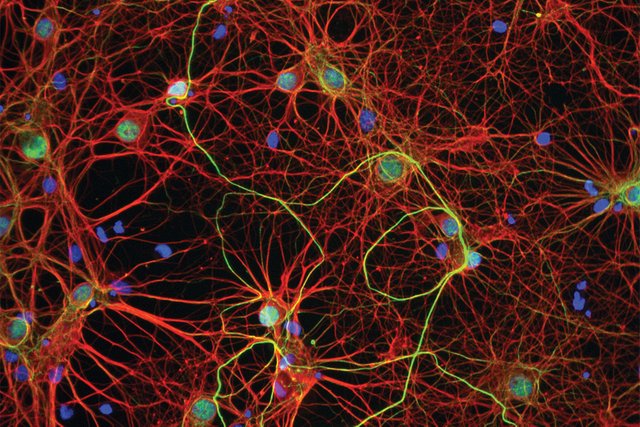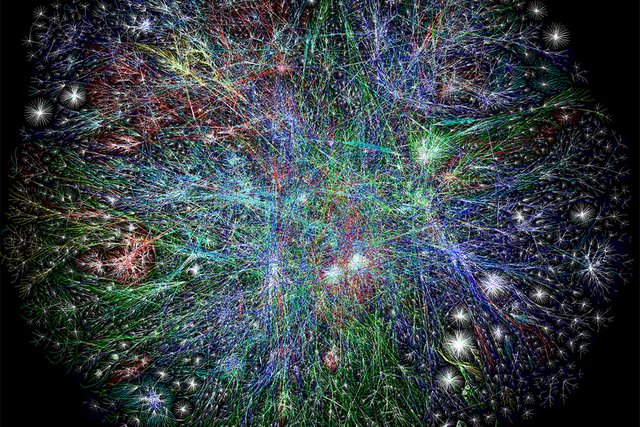Relationships of the Future

We're currently living at a time when there are a lot of social changes underway at relatively rapid speeds (compared to the past), due in large part to the Global Brain. Until recently, humankind made a lot of progress when it comes to our scientific and technological development, but we've basically remained stagnant when it comes to social developments. Sure, there was some progress over the course of thousands of years, but today we're essentially still struggling with the same anti-social systems that were forced upon us thousands of years ago. In terms of our social development, we're still pretty much barbarians, and are just beginning to realize this now, which is what's causing a worldwide search for new and more sustainable ways of living together. And it's in this overall process that our relationships are also undergoing major changes.
Before I continue, I want to clarify that when I mention "relationships" in this post, I'll be focusing more on what we know today as "romantic relationships" which are generally based on attraction or lust between two individuals. However, the basic concepts that I will discuss also apply to all kinds of relationships between individuals, be it friendships, family, business relationships etc.
When it comes to our social development, there's a transition going on right now towards the natural or universal order. We can also see this happening when it comes to our relationships; these days there's a trend towards having open relationships (friends with benefits, no strings attached, etc.) instead of the traditional exclusive relationships that we've had in the past, such as the exclusive romantic relationships between two people that usually ended up in marriage. Like I discussed in the past in my post on marriage, divorce rates are rising globally, and a constantly growing number of people are choosing to stay single. In addition, we're seeing that polygamy is also slowly becoming more accepted in society, no doubt because people are beginning to realize that humans are naturally polygamists, and that there's no sensible reason for why a person would choose to limit themselves by tying themselves exclusively to another person, and suffer all the disadvantages that come with that.
What's happening is that we're transitioning from the traditional exclusive relationships -- which create artificial scarcity, severely limit every individual in society and make them dependent -- towards open and non-exclusive relationships -- which create abundance, respect the sovereignty of every individual, and are based on true love. In other words, we're transitioning towards relationships that are based on a peer to peer (P2P) social networking model, which is the way everything in nature fundamentally works (nature is fundamentally a P2P system).
I'll try to explain this with some illustrations. First we'll take a look at traditional exclusive (monogamous) relationships.

In the illustration above there's a simplified situation of 13 individuals. Let's say that these 13 individuals, named A to M, are living inside a small community. As you can see in the illustration, 12 of them are tied in exclusive relationships with each other (indicated by the blue lines). One of the things that's immediately obvious is that person A is put at a disadvantage, because there's nobody left to connect with. Person A finds themselves in a situation of artificial scarcity; even though there are potentially 12 other individuals to connect with in the community, due to the artificial social rules that demand exclusivity, person A has little choice but to stay alone.
Artificial scarcity not only affects person A, but also affects all the other 12 individuals in the community. Consider what would happen if person B would want to split up with person H. In that case, person B would also not have a lot of other options to choose from -- only person A. And maybe person B isn't attracted to person A, so B would also have little choice but to stay alone after breaking up. This is why, for example, in our current societies many people often choose to stay in bad relationships; they have little choice (or at least perceive their situation that way), are dependent on a single person, and desperately hold on to what they have. And ironically, as I've discussed in the past in my post on marriage and exclusive relationships, it's precisely the fact that people stay with a partner in an exclusive relationship hoping for it to be long-lasting and stable, that causes their relationship to eventually become problematic and unstable.
This situation of artificial scarcity also causes people to want to compete with each other, which further causes them to develop anti-social and even predatory behavior. You can no doubt imagine that person A might eventually become so desperate that they might try to seduce one or more of the other individuals that are tied in exclusive relationships. Or in case person B and H were also single, then they might have to compete against each other for person A. And in that process, things often get very ugly, as we know from what's currently going on in reality in our societies around the world. In competing for a partner, people begin to lie and deceive each other, become jealous, and in extreme cases even become violent.
Another very important problem in the above situation is that any breakup or loss of a partner can be potentially devastating for the individuals involved, because each one of them has all their eggs in one basket, so to speak. For example, if person H dies for some reason, then person B may suddenly find themselves alone and with a huge loss. There's no backup or fallback plan. And that should strike us as very strange, since we're living in a time right now when we're constantly trying to build redundancy into many of our systems, especially those that are very important in our daily lives. If we're building redundancy into our critical information-, energy- and medical systems, then why don't we have redundancy for the important relationships in our lives -- especially our "love life?" Can't a potential (sudden) loss there not cause equally as much grief to us?
All of the above, and many more reasons that I won't get into here for the sake of brevity, make this kind of community that's based on exclusivity a very fragile and dangerous community for its members. It does, however, make an ideal community for those who are seeking to easily control, manipulate and enslave large groups of people -- which is exactly why such a social system was forced upon humankind thousands of years ago.
Now let's consider another kind of community -- one that's not based on exclusivity, but is instead based on the P2P social networking model.

In the above illustration we have the same 13 individuals as before, but now they are all in non-exclusive relationships with one another (indicated by the orange lines). For example, we can see that person A has non-exclusive relationships with J, L, G and H. Person I has non-exclusive relationships with B and G. And in both cases, every one of the other individuals (J, L, G, H and B) has their own non-exclusive relationships with other individuals as well.
What is immediately obvious from this situation is that there's abundance in this community. Nobody is left behind. Everyone is involved and there's plenty for everyone's needs. Whereas person A was forced to stay alone in the previous example where there were only exclusive relationships, in this community person A can still connect with other individuals who might also be interested in doing so -- even if they're already in other non-exclusive relationships! Indeed person A may connect with as many other individuals as they need in their life at any given point in time. And the number of relationships may vary over time depending on person A's needs and circumstances (self-regulation).
Another advantage that's also immediately obvious by just looking at the above illustration, is that there's a lot of redundancy built into this community when it comes to their relationships with each other. Let's say, for example, that person G dies for some reason, then in that case person A doesn't suddenly find themselves alone in the world without a partner. Yes, person A will suffer a loss, but this loss will be made a lot more bearable because persons H, J and L will potentially be able to immediately provide a certain level of comfort and support to person A, and (at least temporarily) fill in the gap left behind by person G. The result of this is of course a much higher degree of resilience and stability inside every individual's life, and consequently, the entire community.
Now consider what would happen when person H consistently behaved badly towards person A. In this case it would be a lot easier for person A to break up with person H, because person A would be able to fall back on their other relationships with G, J and L. At the very least, person A would still be able to rely on receiving love, sex and intimacy from the other 3 individuals after breaking up with H. In addition, because of the non-exclusivity in this community, it's also potentially easier for person A to start a new relationship with any other individual that's interested. So person A would be a lot less likely to stay in a bad relationship with anyone because of the abundance and availability of options! This further means that people would quickly stop taking each other for granted, because they would realize that any partner is free to leave at any time and has other options. As a result, people would start valuing and treating their partners better in order to be able to enjoy their company longer.
Another reason why people would value their partners much more in this community, is because having multiple partners makes you appreciate the positive qualities that exist in a specific partner, that others don't have. It makes you realize and notice their unique qualities more easily, because you know from experience that you cannot find those qualities in the other people you're also seeing. Having multiple partners also means that it'll usually take much longer to get bored with each other, which usually happens very fast when two people are in an exclusive relationship with each other. People can spend time away from each other while their needs are still being met by other partners, and then get back together again when they feel the need to see each other. In this way they can also have and enjoy a lot more variety in their lives, because they can have a variety of experiences with as many partners as they need at any given point in time, allowing them to learn and grow in a much more balanced way, which is what life is all about as I explained in my post on The Cycle of Life.
There are no soul mates and perfect partners who can satisfy all of our needs all the time. Instead of tying ourselves exclusively to a single partner and expecting that person to constantly satisfy our every need (which is impossible and causes a lot of problems), we're supposed to go out and find others who can fill in the gaps. This also gives us the ability to choose to enjoy only the positive qualities of every individual, instead of having to accept the negative qualities along with the positive qualities, as the case is in exclusive relationships. People can come together only to enjoy what they like about each other, without having to deal with, or do, the things they don't like. For example, person A and G could go dancing together during the weekends, but during the week A and J might spend time together having long and deep conversations -- the kind of conversations A could never have with G because G is just not into that type of stuff. If A and G were in an exclusive relationship, then A would expect G to have those kinds of conversations with them and this would lead to problems. But in the above situation based on non-exclusive relationships, A is free to go to J for those conversations and doesn't have to bother G with that. Similarly, G is free to do with others what they can't do with A. More freedom, less conflicts, more satisfaction, more happiness.
This is what relationships will look like in the future; they'll be non-exclusive connections, varying in duration, strength and depth, between strong and highly independent individuals in society.
There's a lot of redundancy built into nature (the universe is a fractal system -- redundancy is built-in), so as we transition our social systems to be more in harmony with nature, we'll automatically start to benefit from redundancy in our social systems, including our relationships. This means that we can indeed have redundancy in our "love lives," and like I explained above, there are many advantages that come with that.
If you're still in doubt about the fact that living in a community based on non-exclusive relationships brings us closer to nature -- closer to the universal order -- then take a look at the image below of interlinked neurons. It's absolutely no coincidence that the orange connections in the above illustration of non-exclusive relationships look a lot like the connections between the neurons. You can find these connection patterns everywhere in nature, and that's because nature is fundamentally a P2P system.

That's why it's also absolutely no coincidence that you can see the same pattern in the graph of the Internet in the image below; the Internet is also a P2P system.

All relationships, interactions and processes that come naturally and are sustainable follow the above P2P connection patterns -- and that includes our love- and sexual relationships.
Like I mentioned in the past, when it comes to love, there's a lot of artificial scarcity in our societies around the world that's completely unnecessary. People complain about how difficult it is to find love these days while they fail to realize that it’s their own behavior of demanding exclusivity and restricting people to love that's making love scarce. We have to stop treating the people we love like our property and we have to start respecting the freedom of each individual. In other words, we have to start to realize and understand what it means to truly love an individual. The more people understand true love, the closer we'll get to experiencing the relationships of the future, and the closer we'll get to building a more stable, resilient and sustainable human society on Earth.